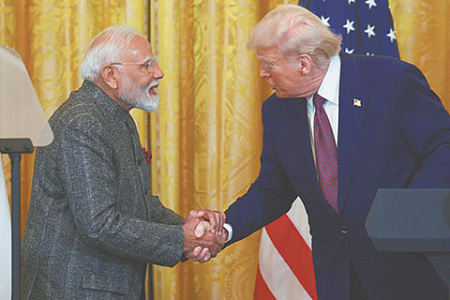
Former U.S. President Donald Trump’s recent assertion that Indian Prime Minister Narendra Modi privately assured him of a gradual cessation of Russian oil purchases has sent diplomatic tremors through New Delhi, igniting a fervent debate within government circles and among opposition leaders. Trump’s claim, delivered without immediate corroboration, has placed India’s strategic energy policy under renewed global scrutiny, forcing Delhi to navigate a complex geopolitical tightrope.
Responding to the potent claim, India’s Ministry of External Affairs (MEA) adeptly sidestepped a direct confirmation or denial. MEA spokesperson Randhir Jaiswal articulated India’s consistent priority: safeguarding the interests of its domestic consumers amidst volatile global energy markets. He emphasized that India, a significant importer of oil and gas, bases its import policy solely on ensuring price stability and reliable supply, necessitating a diversification of energy sources in line with market conditions. This approach, he noted, has always been the guiding principle for the Indian government.
This latest development unfolds against a backdrop of sustained Western pressure on India following the Ukraine conflict, with nations questioning Delhi’s continued engagement with Moscow on energy. The Trump administration itself, during its tenure, previously escalated tariffs on Indian imports from 25% to 50% in a bid to compel India to reduce its reliance on Russian oil. At that time, Prime Minister Modi reportedly rejected these demands, with Indian officials retorting by spotlighting alleged double standards where some U.S. allies continued trade with Russia.
Jaiswal further elaborated on India’s evolving energy relationship with the United States. He highlighted that India has consistently aimed to increase energy purchases from the U.S. over the past decade, noting a gradual increase in imports. The current U.S. administration, he added, has also expressed interest in deepening energy cooperation with India, with ongoing discussions aimed at bolstering these ties. This subtle pivot served to underscore India’s multi-faceted energy strategy without directly addressing the Russian oil question.
The former U.S. President’s remarks have consequently provided ammunition for India’s domestic political arena. Rahul Gandhi, leader of the prominent opposition Indian National Congress party, publicly contended that Prime Minister Modi was yielding to external pressure, asserting that Modi’s overtures to Trump stemmed from fear, despite Washington’s perceived condescension towards the Indian government. Concurrently, Indian External Affairs Minister Subrahmanyam Jaishankar weighed in, stressing Delhi’s commitment to securing the most advantageous deals for its citizens. He also critiqued what he termed Western double standards, where European challenges are framed as global imperatives, while issues pertinent to other parts of humanity are often overlooked.
From Moscow, Kremlin spokesperson Dmitry Peskov maintained a cautious stance, stating that Russia relies on the official pronouncements emanating from the Indian Ministry of External Affairs in Delhi, which he noted are publicly accessible. This indicates Moscow’s strategy of adhering strictly to official diplomatic channels amidst the swirling speculation.
International relations experts offer a pragmatic view on India’s likely trajectory regarding Russian oil. Alexey Kupriyanov, head of the Indian Ocean Region Centre at IMEMO RAS, suggests that India is unlikely to abandon Russian oil imports entirely. He interprets Trump’s ‘gradual process’ comment as a diplomatic tactic, reminiscent of India’s past negotiations, such as the 2018 discussions over American weaponry which ultimately led to the acquisition of Russian S-400 missile systems. Kupriyanov posits that such ‘processes’ can span years, if not decades, and while India might increase purchases of U.S. oil, especially if offered discounts, these would not significantly displace Russian supplies, underscoring America’s inability to fully compensate for Russian volumes.
International media outlets are also keenly observing Delhi’s delicate balancing act. The Washington Post has reported that while India might ideally wish to curtail Russian oil procurements, domestic political considerations and the potential blow to the government’s prestige make such a move challenging. Reuters, citing industry sources, indicates that some Indian refineries are indeed preparing for a measured, albeit gradual, reduction in Russian oil imports. Market analyst Toni Saikomur from British firm IG acknowledged that a complete cessation of Indian purchases from Russia would contribute to global oil price stabilization, yet he conceded that India may not align with Western expectations on this front, highlighting the nation’s pursuit of strategic autonomy in its energy policy.
